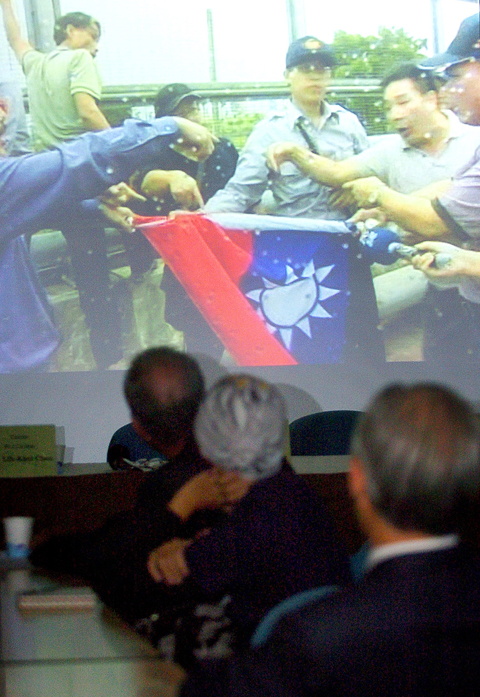A pro-independence organization yesterday released a documentary recounting how the police used excessive force to block people from expressing their opinions and protesting during the visit of Chinese envoy Chen Yunlin (陳雲林), and said the documentary would be delivered to several international human rights organizations in the hope they would pay more attention to Taiwan’s human rights situation.
“By producing the documentary, we hope to draw the attention of international society [to the fact] that human rights in Taiwan have been seriously violated and democracy has been jeopardized during President Ma Ying-jeou’s (馬英九) administration,” Secretary-General of the Taiwan Society Lo Chih-cheng (羅致政) told a press conference yesterday.
The documentary was shown during the press conference. The film contained footage of national flags being taken from people carrying or waving them by police officers, police pushing protesters and people injured in clashes with police officers, and police officers rushing into a record store and forcing it to close while it was playing a patriotic Taiwanese song.

PHOTO: LO PEI-DER, TAIPEI TIMES
International human rights worker Lynn Miles said that Taiwan had been a free country.
Foreigners who visited Taiwan usually felt it was freer than many other countries. But Taiwan’s human rights were jeopardized during the Chen incident, Miles said.
He said as a human rights worker living in Taiwan for many years, he could not believe what happened during Chen’s visit.
Former Government Information Office (GIO) minister Shieh Jhy-wey (謝志偉) said Ma was schooled in the authoritarian tactics of the Chinese Nationalist Party (KMT), and that he never really understood the ideas of human rights and democracy. Ma had done nothing in his life to promote human rights or democracy, Shieh added.
The Ma administration’s alleged misuse of the Taiwanese justice system and police to undermine human rights have drawn international criticism in recent weeks.
Freedom House — the US-based pro-Democracy group — has called for an independent investigation into violent clashes between police and activists protesting the visit to Taiwan by Chen.
The International Federation for Human Rights has also charged that arrests and violence during the visit were “grave violations of human rights under the pretext of national security,” and a substantial number of foreign experts on Taiwan called for reform in two open letters published by the Taipei Times.
Amnesty International called for the Control Yuan to conduct an independent inquiry into alleged excessive police force during the protests last month.

Taiwan is to commence mass production of the Tien Kung (天弓, “Sky Bow”) III, IV and V missiles by the second quarter of this year if the legislature approves the government’s NT$1.25 trillion (US$39.78 billion) special defense budget, an official said yesterday. Commenting on condition of anonymity, a defense official with knowledge of the matter said that the advanced systems are expected to provide crucial capabilities against ballistic and cruise missiles for the proposed “T-Dome,” an advanced, multi-layered air defense network. The Tien Kung III is an air defense missile with a maximum interception altitude of 35km. The Tien Kung IV and V

The disruption of 941 flights in and out of Taiwan due to China’s large-scale military exercises was no accident, but rather the result of a “quasi-blockade” used to simulate creating the air and sea routes needed for an amphibious landing, a military expert said. The disruptions occurred on Tuesday and lasted about 10 hours as China conducted live-fire drills in the Taiwan Strait. The Civil Aviation Administration (CAA) said the exercises affected 857 international flights and 84 domestic flights, affecting more than 100,000 travelers. Su Tzu-yun (蘇紫雲), a research fellow at the government-sponsored Institute for National Defense and Security Research, said the air

Taiwan lacks effective and cost-efficient armaments to intercept rockets, making the planned “T-Dome” interception system necessary, two experts said on Tuesday. The concerns were raised after China’s military fired two waves of rockets during live-fire drills around Taiwan on Tuesday, part of two-day exercises code-named “Justice Mission 2025.” The first wave involved 17 rockets launched at 9am from Pingtan in China’s Fujian Province, according to Lieutenant General Hsieh Jih-sheng (謝日升) of the Office of the Deputy Chief of the General Staff for Intelligence at the Ministry of National Defense. Those rockets landed 70 nautical miles (129.6km) northeast of Keelung without flying over Taiwan,

A strong continental cold air mass is to bring pollutants to Taiwan from tomorrow, the Ministry of Environment said today, as it issued an “orange” air quality alert for most of the country. All of Taiwan except for Hualien and Taitung counties is to be under an “orange” air quality alert tomorrow, indicating air quality that is unhealthy for sensitive groups. In China, areas from Shandong to Shanghai have been enveloped in haze since Saturday, the ministry said in a news release. Yesterday, hourly concentrations of PM2.5 in these areas ranged from 65 to 160 micrograms per cubic meter (mg/m³), and pollutants were